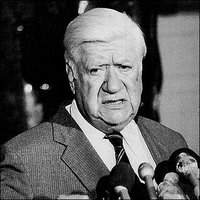
 In 1982, allegations of sexual improprieties regarding Pages in the House of Representatives were aired in the news. Democrat House Speaker O'Neill and Republican Minority Leader Robert Michel together asked Joseph Califano to be lead counsel for the House Ethics Committee investigation with instructions to follow wherever the evidence took him. At the conclusion of the investigation, the Committee which was split evenly between Democrats and Republicans, voted unanimously to censure two congressmen for taking sexual liberties with underage Pages.
In 1982, allegations of sexual improprieties regarding Pages in the House of Representatives were aired in the news. Democrat House Speaker O'Neill and Republican Minority Leader Robert Michel together asked Joseph Califano to be lead counsel for the House Ethics Committee investigation with instructions to follow wherever the evidence took him. At the conclusion of the investigation, the Committee which was split evenly between Democrats and Republicans, voted unanimously to censure two congressmen for taking sexual liberties with underage Pages.Califano writes in today’s Washington Post:
His article is worth reading. You can find it here.The course the House took in that scandal, and its reaction to the current one,
show the difference between a leadership that saw a threat to the integrity of
the House of Representatives and one that sees a threat to its continuing
control of the institution. It's useful today to remember that there was a time
when partisanship took second place to trust and the House leadership had the
strength to wash its own dirty laundry.
2 comments:
Surprisingly, Califano has his facts wrong. Crane didn't resign, but his constituents had the dignity to kick him out of office in the next election. I specifically remember running into him (while interning on the Hill) at a reception in the summer of 1984, and knowing of his misbehavior. The only guy who would talk to him was his brother, Congressman Phil Crane.
Of course, this article is every bit as partisan as blogosphere attacks. No credible evidence has been offered to demonstrate that House leadership was made aware of anything more than suspicious but non-explicit e-mails.
But why let those facts get in the way of a good, partisan rush to judgment?
Barone looked back too and drew a different conclusion,
Yet 23 years ago, in 1983, the House administered a lesser punishment–censure–when Republican Dan Crane and Democrat Gerry Studds admitted to having had sex with two pages, Crane with a 17-year-old girl and Studds with a 17-year-old boy. So the standard seems to be that having sex with a serving page, for whom Congress has custodial responsibility, merits censure. But sending dirty IMs to a former page, for whom Congress no longer has custodial responsibility, merits the much harsher penalty of expulsion.
Studds (a UU) defiant right threw it all and reelected repeatedly despite censure.
Hastert's my rep. I think when he found out, he threw Foley out... whether he should have known earlier... I don't know. But I like today's standard better.
Post a Comment